Even as bird flu looms, the world is unlearning Covid’s lessons
The simmering fears over bird flu should leave no doubt: The health of humans and our fellow animals is inextricably linked.
Covid-19 was likely transmitted from animals to humans, and millions died as a result. The world is now anxiously watching for any sign that H5N1, i.e., the bird flu, could cause another pandemic so soon after the last one.
For years, public health experts have preached the importance of a One Health philosophy: treating the health of the environment, animals, and human beings as a single issue that requires a comprehensive approach because the health of one affects the others. On the ground, however, it remains a work in progress; the slow implementation of livestock surveillance for bird flu is only the latest example of that struggle.
The world’s nations are currently negotiating a pandemic treaty that was supposed to prevent humanity from repeating the mistakes of Covid-19. In particular, the agreement was seen as an opportunity to put those One Health principles into practice.
But we might miss our chance. As the pandemic fades into memory, self-interest appears to be winning out over global cooperation.
What the world could do — and what it seems like it’ll do instead
In December 2021, the World Health Assembly, the governing body of the World Health Organization, announced that it would “draft and negotiate a convention, agreement or other international instrument … to strengthen pandemic prevention, preparedness and response.” The goal was to create a binding international agreement that would compel countries around the world to take steps to prevent future pandemics and, should those efforts fail, to ensure smoother coordination in any future public health emergency.
Negotiators are supposed to largely wrap up their work by Friday, May 10. Representatives from the world’s governments will convene in Geneva on May 27 for the World Health Assembly. The plan is for the pandemic accord to be ratified before the assembly adjourns.
Even with the threat of H5N1 looming, however, it has become clear the world is downsizing its ambitions for the treaty. In place of firm commitments are vague aspirations.
On two important sections — the One Health measures and the establishment of a system to share pathogens between countries — the latest draft text would defer momentous operational decisions until at least 2026.
One Health has been one of the major points of contention: Rich countries want it because it would lead to a significant investment in disease surveillance in poorer countries, where it is easier for threatening pathogens to lurk unnoticed. But poorer countries dislike it for the same reason, arguing it amounts to a massive unfunded mandate placed on them.
“It’s a vital step to reduce future pandemic risks. But achieving this demands substantial and costly changes,” Suerie Moon, co-director of the Global Health Centre (GHC) at the Graduate Institute of International and Development Studies, told Geneva Solutions. “It requires changing how we raise livestock and animals.”
Comparing the text of an October 2023 draft of the treaty and the most recent draft reveals the dwindling ambition. In the earlier version, there were specific commitments that called for stronger animal surveillance, more research and more education for health workers and communities, and a “whole of government” and “whole of society”In the latest version of the draft, much of the language concerning One Health principles has been removed. Governments now have more flexibility to “promote” and “engage” in these principles as they deem appropriate.
However, the main issue once again revolves around money. Poor countries already allocate significantly less funding to healthcare compared to wealthier nations. Historically, long-term economic growth has been key to increasing healthcare spending.
Developed nations are urging developing countries to make new investments now, but the latter argue that rich countries should assist financially. While demanding One Health investments, wealthy nations are hesitant about a proposal that would aid in identifying and combatting dangerous pathogens globally.
The concept of pathogen access and benefit sharing (PABS) has been under discussion, emphasizing that wealthy nations or pharmaceutical companies should bear the cost of accessing pathogens from developing nations and agree to share derived benefits, such as diagnostics and vaccines, with these poorer countries. However, this idea faces opposition from rich countries and pharmaceutical firms who argue that such a system could be overly bureaucratic and impede innovation during future public health crises.
Some experts have pointed out the irony of wealthy countries, particularly the US and Europe, seeking unfettered access to pathogens from low-income nations while hesitating to share data regarding pathogens like H5N1 promptly. This dichotomy highlights the disparities in pathogen sharing practices between different regions.
Currently, negotiations are entangled in last-minute discussions where developed countries are attempting to broker a compromise by linking PABS with the One Health provisions. Nevertheless, the probable outcome seems to be a symbolic commitment to One Health principles with a directive to establish more specific provisions within the next two years.
The disappointing resolution underscores the challenges the world faces in applying the lessons learned from the Covid-19 pandemic. As concerns surrounding bird flu escalate, the global community struggles to prioritize collective safety against individual self-interest and geopolitical conflicts.
It is essential to address these issues to prevent potential future pandemics effectively.






